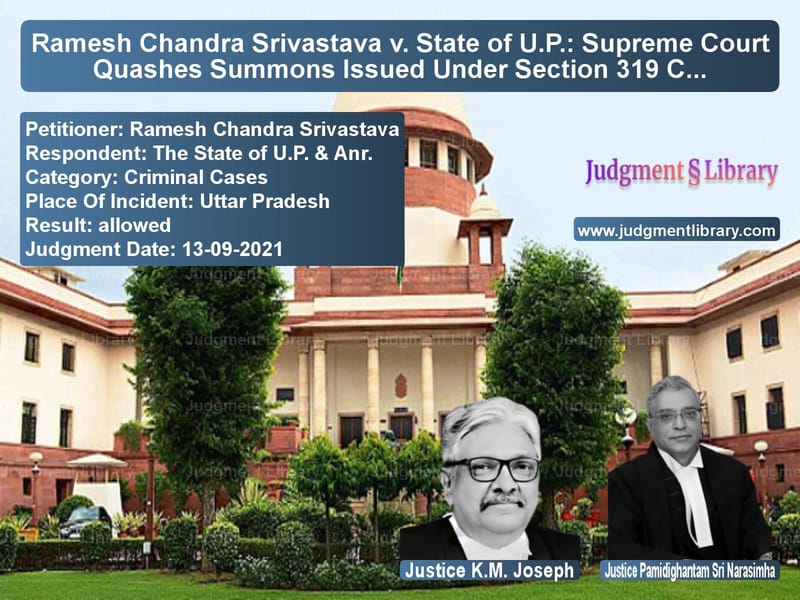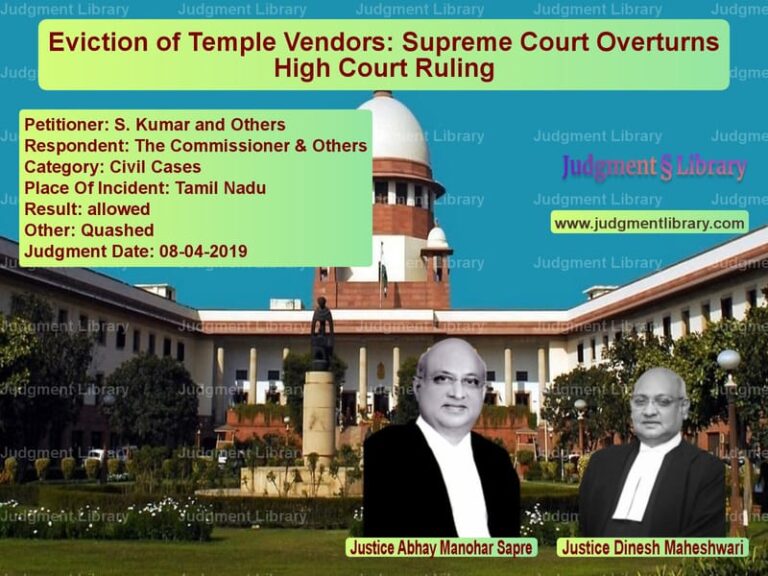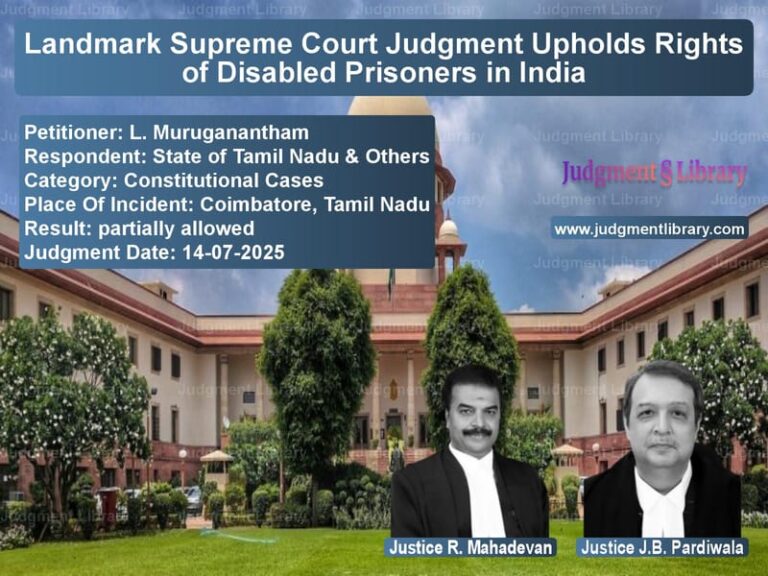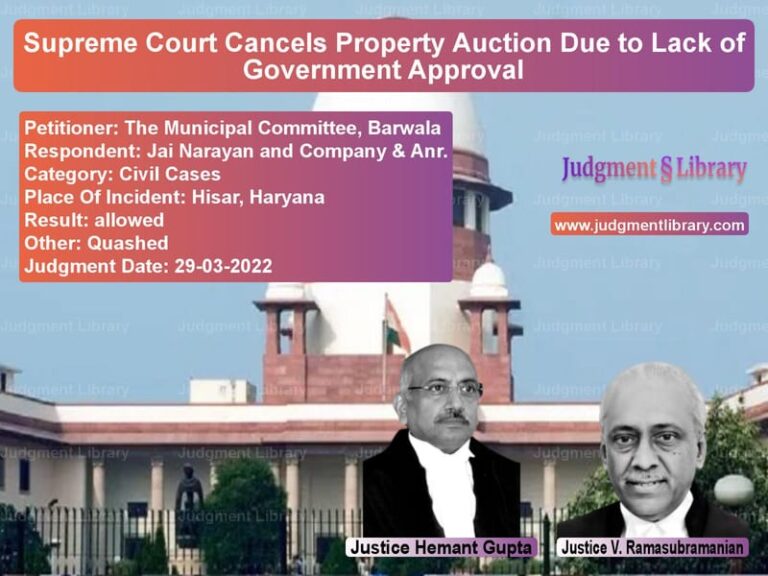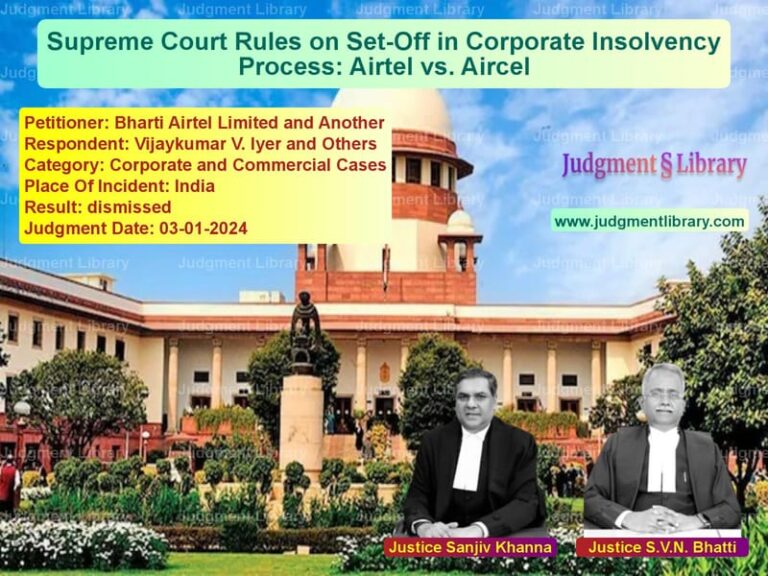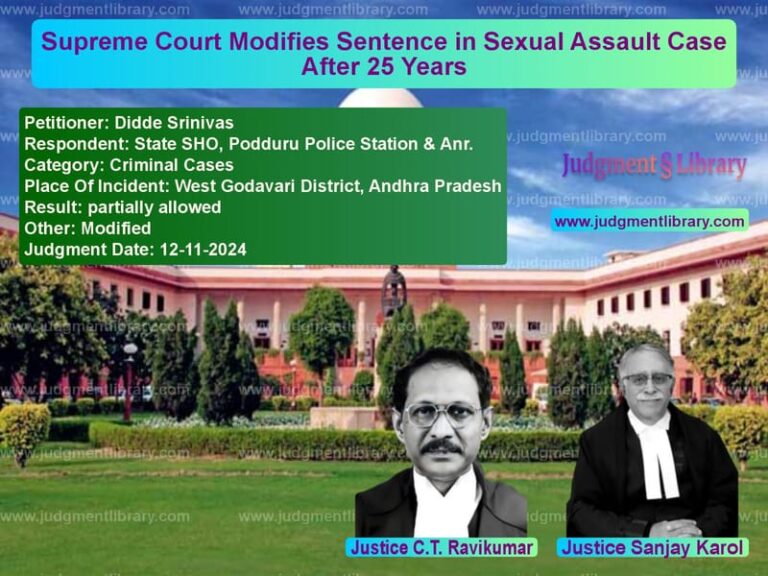Ramesh Chandra Srivastava v. State of U.P.: Supreme Court Quashes Summons Issued Under Section 319 CrPC
The case of Ramesh Chandra Srivastava v. The State of U.P. & Anr. revolved around the invocation of Section 319 of the Code of Criminal Procedure (CrPC), a provision that allows courts to summon additional accused persons if evidence presented during trial suggests their involvement in the crime. The Supreme Court was called upon to decide whether the lower courts had correctly applied the standard required for summoning the appellant, Ramesh Chandra Srivastava, in connection with a murder case.
Background of the Case
The case began with an FIR filed on June 27, 2015, by the wife of the deceased. According to the FIR:
- The deceased was employed as a driver for the appellant, Ramesh Chandra Srivastava.
- On the day of the incident, the deceased informed his wife that he was leaving for work and was going to meet the appellant.
- Later, the deceased called his wife at 2 p.m., stating that he was going to Gola and would return by evening.
- His phone was subsequently switched off, and later, an unidentified dead body was found.
- The complainant alleged that her husband was murdered by the appellant with the help of his associates.
During the investigation, a chargesheet was filed against three persons, but the appellant was not named as an accused.
Trial and Invocation of Section 319 CrPC
During the trial, the complainant (wife of the deceased) deposed before the court on August 5, 2017. In her statement, she reiterated:
- Her husband had left home on the morning of the incident after receiving a call from the appellant.
- At around 2 p.m., he called her and said he was going to Gola with the appellant and would return by evening.
- When she called the appellant, he informed her that the deceased’s car was found near a government tubewell, and his slippers were inside the car.
- She firmly stated that she and her family believed the appellant had murdered her husband with the help of others.
Based on this deposition, the prosecution filed an application under Section 319 CrPC, requesting the court to summon the appellant as an additional accused. On September 11, 2018, the Sessions Judge, Khiri, allowed the application and issued summons. The appellant challenged this order before the High Court, but his plea was dismissed. Consequently, he approached the Supreme Court.
Supreme Court’s Observations
The Supreme Court, comprising Justices K.M. Joseph and Pamidighantam Sri Narasimha, examined the case and quashed the summons issued against the appellant. The Court emphasized the stringent standard required for invoking Section 319 CrPC and cited its previous rulings in:
- Hardeep Singh v. State of Punjab (2014) 3 SCC 92
- Labhuji Amratji Thakor v. State of Gujarat (AIR 2019 SC 734)
Key Legal Principles Reaffirmed
The Supreme Court reiterated the principles laid down in Hardeep Singh regarding the exercise of power under Section 319 CrPC:
“Power under Section 319 CrPC is a discretionary and extraordinary power. It is to be exercised sparingly and only in those cases where the circumstances so warrant. It is not to be exercised merely because the Magistrate or Sessions Judge believes that some other person may also be guilty of committing the offense.”
“Only where strong and cogent evidence occurs against a person from the evidence led before the court should this power be exercised, and not in a casual or cavalier manner.”
The Court further clarified the standard of proof required:
“Though only a prima facie case is required, it must be stronger than the standard used at the time of framing charges. The evidence must be such that, if unrebutted, it would likely lead to conviction.”
Why the Supreme Court Quashed the Summons
The Court found that the lower courts had failed to apply the rigorous standard required for invoking Section 319 CrPC. The main reasons for setting aside the order were:
- The prosecution’s application was solely based on the complainant’s deposition, which was uncorroborated by other evidence.
- The complainant’s statement was primarily based on suspicion rather than direct involvement of the appellant.
- The chargesheet had already been filed against three individuals, and no evidence linked the appellant to the crime beyond the complainant’s belief.
- The order issuing summons lacked a strong evidentiary basis and did not meet the requirement of “more than a prima facie case.”
Supreme Court’s Ruling
The Supreme Court allowed the appeal and quashed both the High Court’s judgment and the Sessions Court’s order issuing summons. The Court remanded the matter back to the Sessions Judge, Khiri, directing the judge to reconsider the application under Section 319 CrPC in light of the principles set forth in Hardeep Singh.
Implications of the Judgment
This ruling has significant legal implications:
- Strict Standard for Summoning Additional Accused: Courts must ensure that summoning an additional accused under Section 319 CrPC is not done casually and must be supported by strong and cogent evidence.
- Protection from Unwarranted Prosecution: Individuals cannot be dragged into criminal trials based on mere suspicion or unverified accusations.
- Clarification on Evidentiary Requirements: The decision reiterates that the standard of proof required to summon an additional accused must be higher than the one used at the stage of framing charges.
Conclusion
The Supreme Court’s decision in Ramesh Chandra Srivastava v. The State of U.P. reinforces the principle that the extraordinary power under Section 319 CrPC must be exercised with caution and only in cases where there is compelling evidence against an individual. By setting aside the lower courts’ orders and directing a fresh evaluation, the judgment ensures that legal proceedings adhere to the highest standards of justice and fairness.
Petitioner Name: Ramesh Chandra Srivastava.Respondent Name: The State of U.P. & Anr..Judgment By: Justice K.M. Joseph, Justice Pamidighantam Sri Narasimha.Place Of Incident: Uttar Pradesh.Judgment Date: 13-09-2021.
Don’t miss out on the full details! Download the complete judgment in PDF format below and gain valuable insights instantly!
Download Judgment: ramesh-chandra-sriva-vs-the-state-of-u.p.-&-supreme-court-of-india-judgment-dated-13-09-2021.pdf
Directly Download Judgment: Directly download this Judgment
See all petitions in Bail and Anticipatory Bail
See all petitions in Judgment by K.M. Joseph
See all petitions in Judgment by P.S. Narasimha
See all petitions in allowed
See all petitions in supreme court of India judgments September 2021
See all petitions in 2021 judgments
See all posts in Criminal Cases Category
See all allowed petitions in Criminal Cases Category
See all Dismissed petitions in Criminal Cases Category
See all partially allowed petitions in Criminal Cases Category

